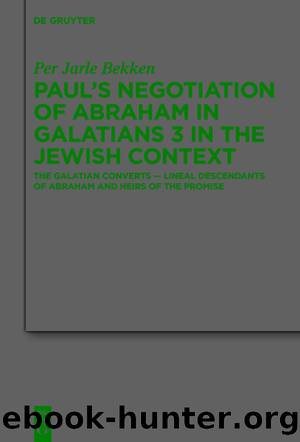Paulâs Negotiation of Abraham in Galatians 3 in the Jewish Context by Per Jarle Bekken

Author:Per Jarle Bekken
Language: eng
Format: epub
Publisher: De Gruyter
Published: 2021-06-21T13:25:28.607000+00:00
Gal 3:11a: á½ Ïι δὲ á¼Î½ νόμῳ οá½Î´Îµá½¶Ï δικαιοῦÏαι ÏαÏá½° Ïá¿· θεῷ [â¦]
Gal 3:11b: á½ Ïι á½ Î´á½·ÎºÎ±Î¹Î¿Ï á¼Îº Ïá½·ÏÏεÏÏ Î¶á½µÏεÏαιΠ(Hab 2:4 LXX)
Gal 3:12b: á½ ÏοιήÏÎ±Ï Î±á½Ïá½° ζήÏεÏαι á¼Î½ αá½Ïοá¿Ï. (Lev 18:5 LXX)
The negative formulation οá½Î´Îµá½¶Ï δικαιοῦÏαι corresponds to the positive scriptural expression ὠδίκαιοÏ, and á¼Î½ νόμῳ corresponds to á¼Îº Ïá½·ÏÏεÏÏ.160 Likewise, á¼Îº Ïá½·ÏÏεÏÏ Î¶á½µÏεÏαι in the formulation of Hab 2:4 corresponds to ζήÏεÏαι á¼Î½ αá½Ïοá¿Ï in the citation of Lev 18:5. The conclusion that can be drawn on the basis of these parallel formulations is that to live âin the lawâ (v.11a) and âin them (i.âe., the observance of the law by doing them; v. 12b)â and to âlive from trustâ are understood as living within two mutually exclusive jurisdictions qualified by righteousness and trust and by observance of the law, respectively.161
This explanation of what ζήÏεÏαι means, referring to a certain mode of living within two mutually exclusive jurisdictions, is confirmed by the proposition Paul makes in Gal 3:12a: ὠδὲ Î½á½¹Î¼Î¿Ï Î¿á½Îº á¼ÏÏιν á¼Îº Ïá½·ÏÏεÏÏ. As we have observed above (in section 2.2), Paul here employs the exegetical texhnique of abandoning one meaning of a scripture in contrast to its proper meaning, in order to distinguish between what it means âto liveâ according to the jurisdiction of Law (summarized by the formula á¼Î¾ á¼ÏγÏν Î½á½¹Î¼Î¿Ï and stated in Lev 18:5) as distinct from the jurisdiction of trust (summarized by the formula á¼Îº Ïá½·ÏÏεÏÏ expressed in Gen 15:6 about Abrahamâs trust in Godâs promise and in Scripture as such according to Hab 2:4).
In sum, Paulâs formulations and juxtaposition of Hab 2:4 and Lev 18:5 (in which he only borrows words from the scriptures without any indication of a marked quotation) do not then reflect a tension or contradiction in Scripture as such, but refer rather to two distinctive jurisdictions in the Torah and Scripture. Thus, as we shall see below, this distinction between these two jurisdictions is presupposed by Paul with regard to the specific role they have in their own right relative to the event of Christ.
Paulâs logic, that those under the âMosaic jurisdictionâ can only incur its curse, might further be explained by his application of the citations of Deuteronomy (not only Deut 21:23 in Gal 3:13, but also Deut 27:26 in Gal 3:10) to the crucifixion of Christ. In accordance with Paulâs emphatic and vivid formulation in Gal 3:1 that the crucified Jesus Christ had been publicly âproscribedâ, Christ is precisely exhibited openly as the one who suffered the curse by virtue of being âhanged on the treeâ (cf. Deut 21:23 in Gal 3:13), and who for this reason was exposed in public as a lawbreaker within the âMosaic jurisdictionâ (cf. Deut 27:26 in Gal 3:10). Thus, in both Gal 3:10 and 3:13, words from the Law about a curse are cited, offering the legal evidence for the proposition formulated by Paul.162 In the following quotations, words from the Law are in italics:
Download
This site does not store any files on its server. We only index and link to content provided by other sites. Please contact the content providers to delete copyright contents if any and email us, we'll remove relevant links or contents immediately.
The Five People You Meet in Heaven by Mitch Albom(3561)
The Secret Power of Speaking God's Word by Joyce Meyer(3182)
Real Sex by Lauren F. Winner(3014)
Name Book, The: Over 10,000 Names--Their Meanings, Origins, and Spiritual Significance by Astoria Dorothy(2979)
The Holy Spirit by Billy Graham(2944)
0041152001443424520 .pdf by Unknown(2843)
How The Mind Works by Steven Pinker(2813)
ESV Study Bible by Crossway(2774)
Ancient Worlds by Michael Scott(2682)
Churchill by Paul Johnson(2578)
The Meaning of the Library by unknow(2565)
The ESV Study Bible by Crossway Bibles(2550)
The Gnostic Gospels by Pagels Elaine(2527)
MOSES THE EGYPTIAN by Jan Assmann(2412)
Jesus by Paul Johnson(2352)
City of Stairs by Robert Jackson Bennett(2347)
The Complete Dead Sea Scrolls in English (7th Edition) (Penguin Classics) by Geza Vermes(2277)
The Nativity by Geza Vermes(2227)
Ancient Near Eastern Thought and the Old Testament by John H. Walton(2223)
